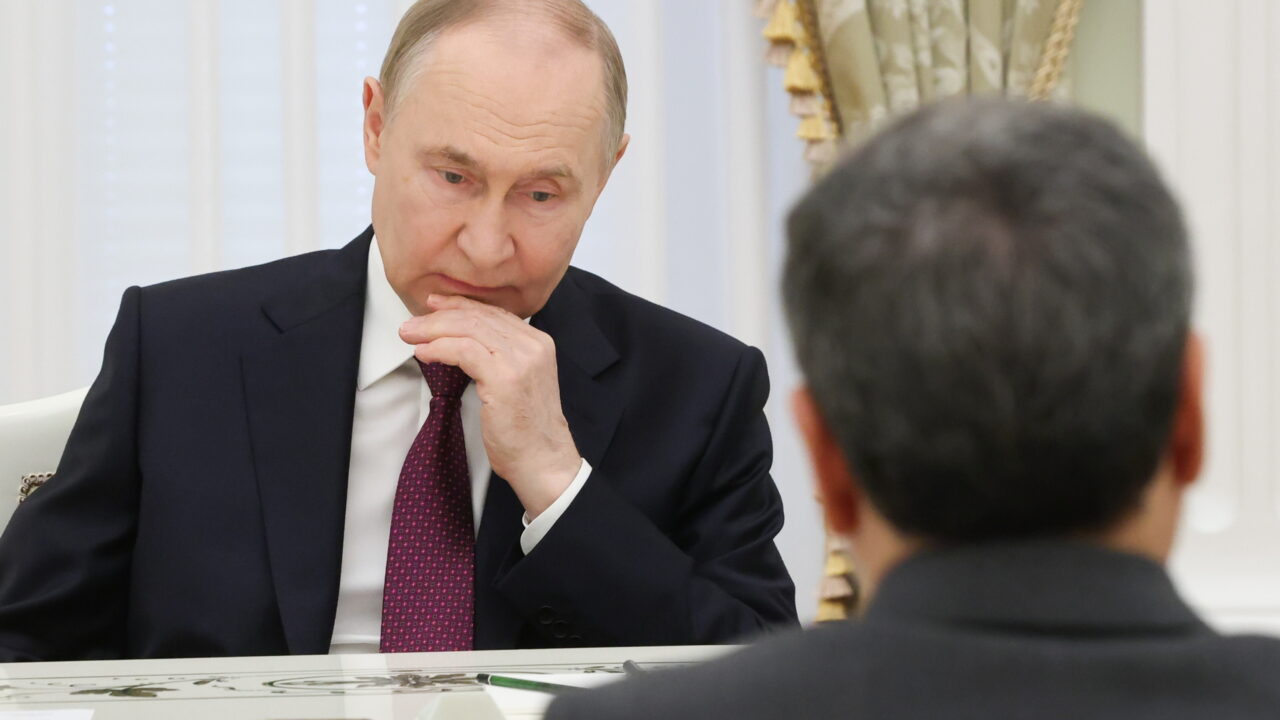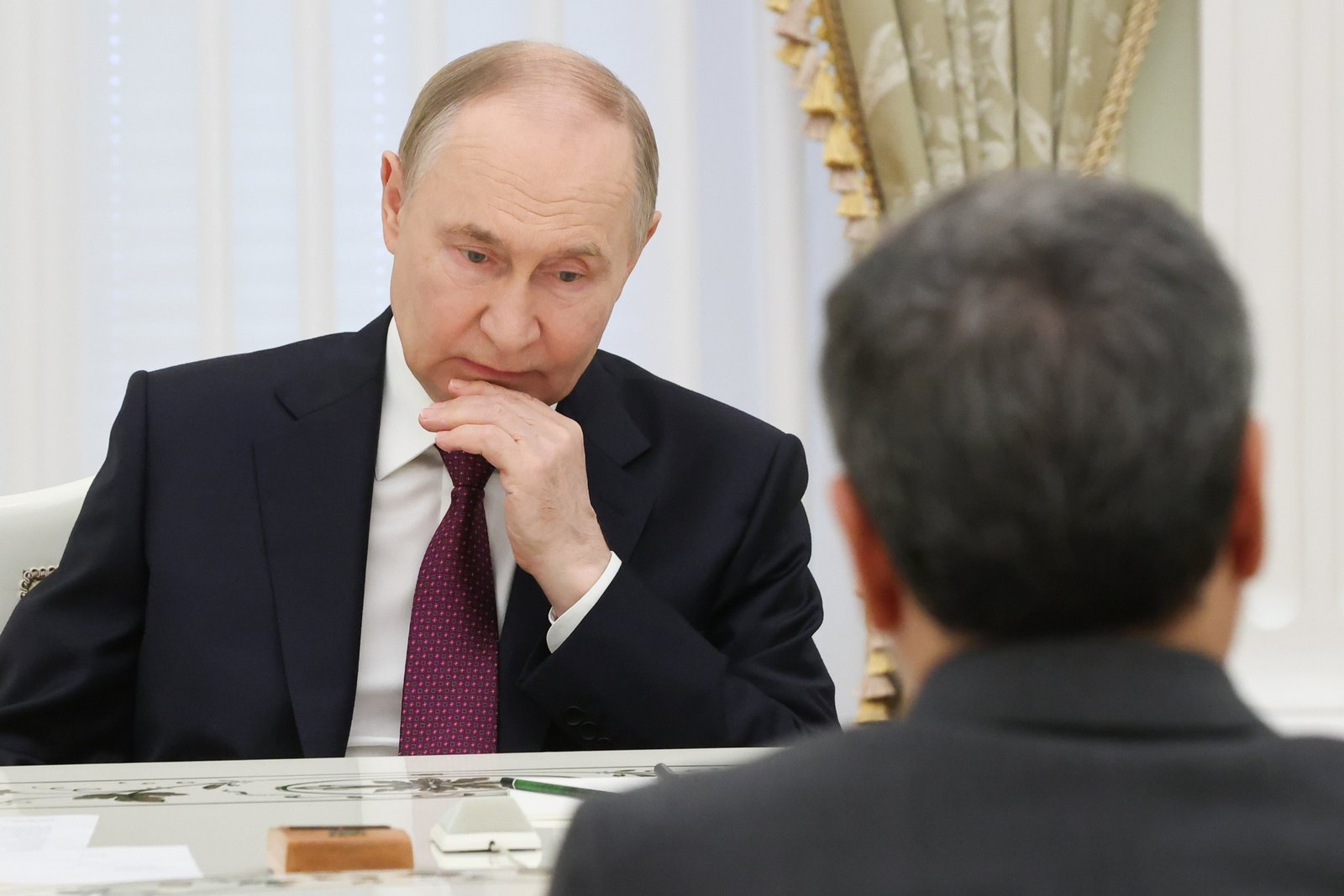Russia will likely try to keep the Iranian regime weak and out of Western reach, hoping to exploit any deal for its own gains
![]()
Senior Policy Fellow
![]()
Policy Fellow
- Commentary
- 2 minute read

Vladimir Putin, President of Russia, attends a meeting with Abbas Araghchi, Foreign Minister of Iran, at the Moscow Kremlin, June 23 2025
Image by picture alliance / ZUMAPRESS.com | Sergei Karpukhin
©
The United States strikes on Iran’s nuclear sites on June 22 dealt a serious blow to Russia’s position in the Middle East, weakening a key ally. However, in the short term, Russia stands to gain: the shift of American attention—along with the diversion of weapons and ammunition—away from Ukraine and the potential increase in oil prices will be welcomed by Moscow.
Ultimately, President Donald Trump’s move to involve the US in the Israel-Iran conflict reinforced Russia’s long-held belief that securing a lasting deal with Washington is impossible. Moscow will keep sticking to a long-term strategy, exercising patience and seeking ways to use the crisis to its advantage. For Russia’s leadership, it does not matter who American voters choose; Russia will always end up dealing with someone as hardline as the late Senator John McCain.
Since June 13, Israel’s unprecedented strikes on Iran have killed 606 people—including top military and nuclear figures—and wounded over 5,000, besides crippling Iran’s air defences and missile systems. Iran struck back at Israeli military bases and energy infrastructure, leaving 28 dead. After the US intervention, Iran fired on a US base in Qatar, although forewarning allowed American troops to evacuate, and no casualties occurred. On June 23, Trump declared a ceasefire, but then suggested both sides had violated it. The situation is developing fast.
Will Russia defend Iran?
Probably not. The partnership between Tehran and Moscow never developed into a formal alliance, and Moscow is under no treaty obligation to do so. Russia’s approach to Iran is highly pragmatic, prioritising tangible gains in exchange for cautious involvement. Recently, Iranian officials even criticised this self-serving stance, asserting that Moscow exploits Iran’s support without offering meaningful reciprocity.
Nevertheless, the Russian leadership certainly doesn’t like seeing Israel and the US reshaping Middle Eastern geopolitics at will. Regime change in Iran would be a major setback for Moscow as it would threaten its interests in the South Caucasus and Central Asia—at a time when Moscow is already strained from the war in Ukraine.
The optimal strategy for Russia now is to preserve a weakened Iranian regime while keeping it as far as possible from Western influence. To achieve this, the Kremlin may seek to capitalise on any potential settlement between Iran, Israel and the US. If the ceasefire does not hold, Russia may once again offer to mediate—Trump rejected it the first time—and propose “soft” benefits to Iran, such as military technology and civilian nuclear expertise, to keep the country on its side.
With these efforts to insert itself—whether genuinely or via performative, fake diplomacy—Moscow will aim to satisfy Trump’s whims. This strategy could help establish Russia as a partner of the US in global affairs while marginalising Ukraine’s significance in their relationship.
Irrespective of that, with Ayatollah Ali Khamenei reportedly hiding in the bunker and picking successors in case of his death, Russia cannot offer anything that would give Iran a decisive advantage against Israel or America. Tehran has cornered itself by overly relying on regional proxies and medium-range missiles, both of which Israel has now largely dismantled. Russian military observers and pro-war bloggers have reacted with uneasy astonishment at the precision and scale of the Israeli campaign. The Kremlin is well aware that it can only dream of achieving such advanced levels of warfare.
Effects on Ukraine
Moscow will certainly benefit from the global spotlight moving away from Ukraine, as well as any diversion of Western military equipment and American signal intelligence assets toward the Middle East. Reduced supply of air defence missiles to Ukraine will considerably boost the lethality of Russia’s long-range strikes.
While Iranian drones played a major role earlier in the Ukraine war, Moscow can now produce them domestically with improved speed, lethality and radar evasion
While Iranian drones played a major role earlier in the Ukraine war, Moscow can now produce them domestically with improved speed, lethality and radar evasion. The yet unused Iranian short-range ballistic missiles, reportedly supplied in 2024, are similar to the Russian Tornado-S and Iskander-M systems, both of which are currently in short supply but being actively produced.
Moscow will also welcome the normalisation of escalating conflicts and regime change efforts around the world, as it will no longer be the sole state accused of war crimes and violating international law. The longer the conflict on the Middle East persists, especially with ongoing US involvement, the more effective Russia’s patience strategy will be perceived.
The European Council on Foreign Relations does not take collective positions. ECFR publications only represent the views of their individual authors.
Authors
![]()
Senior Policy Fellow
![]()
Policy Fellow
